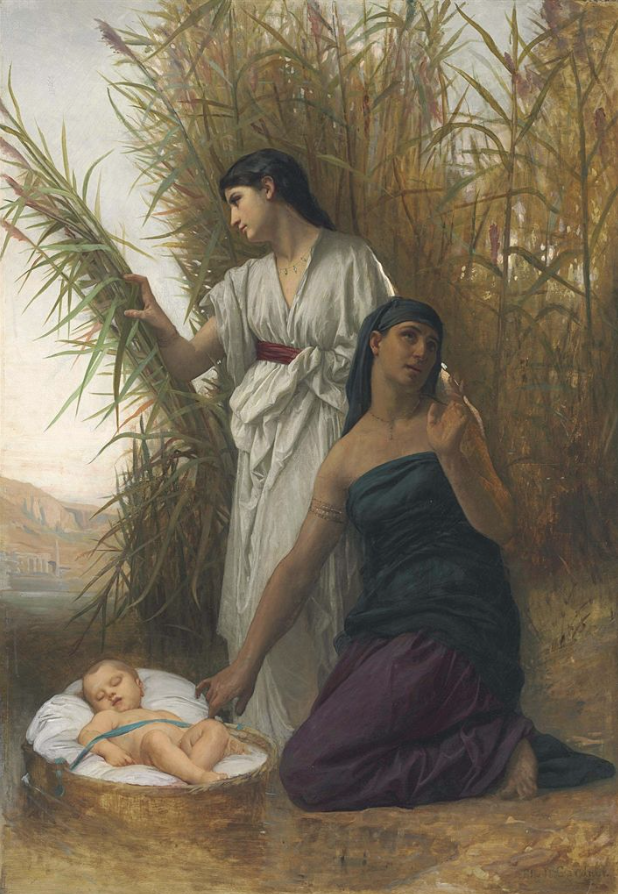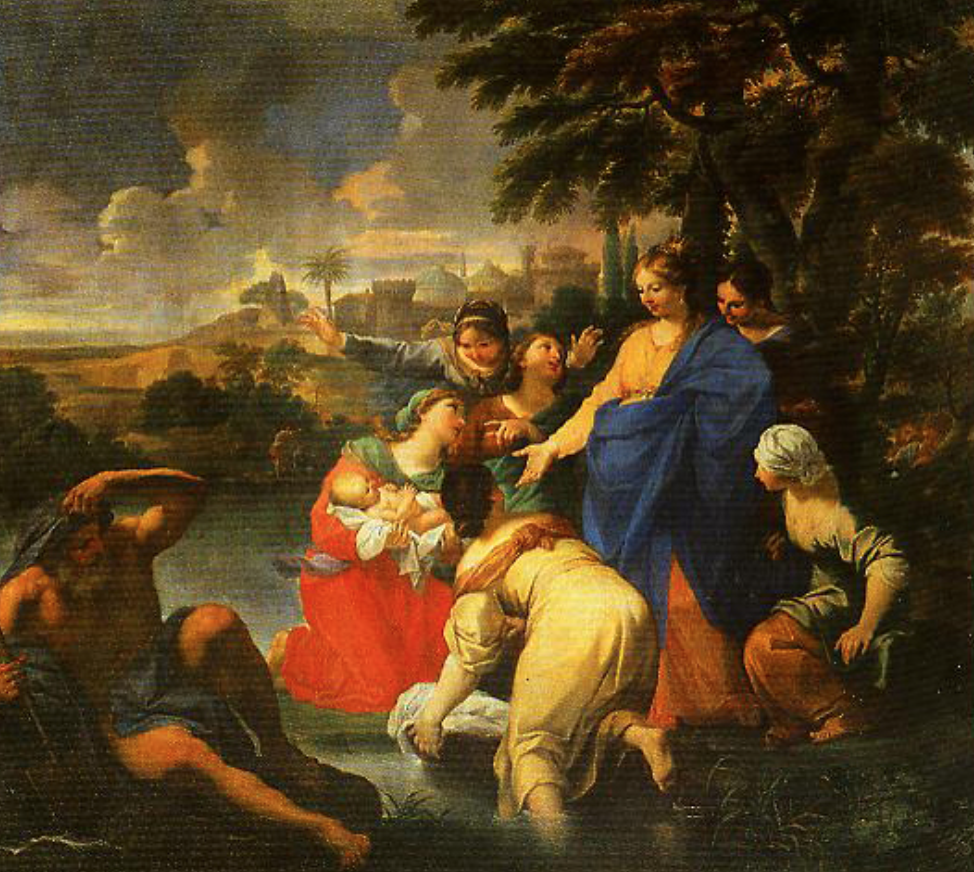
–
A lot of you appreciated the Sunday School Lessons from Joseph I posted a while back so I am following up with our lessons from learning about Moses. For those of you that don’t know the story, I’ll briefly summarize it below in italics. Then below that, I’ll highlight some of the lessons my Sunday School class gleaned.
Story of Moses Summarized
Hundred of years after the Joseph story which brought the children of Israel into Egypt, there are now gobs of Israelites. The Pharaoh at the time found that threatening so he put them into slavery. Since the population still grew, he had a new idea: throw all their baby boys into the Nile. Moses’ mom didn’t want to lose him and hid him as long as possible.
She eventually made a basket out of bulrushes, and set baby Moses in it on the river, sending his sister Miriam to watch to see what happened. Meanwhile Pharaoh’s own daughter comes down to bathe, and sees the baby floating in the basket. She decides to adopt it. Miriam seizes her opportunity and says she knows a wet nurse if that would be helpful. So Moses’ own mother raises him in Pharaoh’s own home.
Moses grows up with all the privileges of being an Egyptian and living in a royal household. But he has a soft spot for the Hebrews, and is saddened by the cruelty he sees toward them. One day he kills one of the Egyptian taskmasters, and then must flee. He ends up in Midian, where he marries, and watches sheep for 40 years.
One day while watching the sheep, Moses sees a burning bush that is not consumed. He goes to check it out and hears God’s voice out of the bush. He is being asked to free the children of Isreal. Moses tries to decline and makes excuses, but his objections were overcome by God turning Moses’ rod into a serpent and back again. So Moses acquiesces, and goes to Pharaoh, asking him to “let their people go.”
Pharaoh is unwilling to do so and ten plagues are sent to Egypt: water is turned to blood, frogs, lice, flies, animal diseases, boils, hail, locusts eat every blade, 3 days of total darkness, and then the eldest sons are found dead. During these plagues, the Israelites in the Land of Goshen were spared, and the process of sparing them from the last plague is what the Jews celebrate as the Passover.
At last they run from Pharaoh and are led by a pillar of cloud by day and a pillar of fire by night, smack dab to the barrier of the Red Sea. With Moses’ staff, God parts the Red Sea and they cross on dry ground. Pharaoh’s men are quickly catching up, but the Red Sea crashes down around them, and they are drowned.
Despite these miracles, the children of Israel are whiners and complain about their lot. God sends them manna (little bread-like bits that taste of honey) in the morning and quails in the evening. They are not to collect more than they need; if they do, it will stink badly and get wormy. God had to sweeten water for them, and another time Moses beat a rock with his staff for water to rush out. They also fought better in wars when Moses held up his arms, so they discovered if Arron helped hold up Moses’ arms, they won.
Near Mount Sinai, Moses went to chat with God and get the Ten Commandments (which we’ll discuss another time). Meanwhile, the ungrateful Israelites made a golden calf to worship, and none of those folks were allowed to see the promised land because of their disobedience. After 40 years of wandering, Moses did see it, but died before entering it. Joshua led the next generation into the promised land.
Lessons from the Story of Moses:
- Even a murderer can be used by God for a divine purpose. So what’s our excuse?
- Feeling threatened and fearful didn’t work for Pharaoh. Neither did harshness. Getting the Israelites’ allegiance would have been a much better approach for everyone. Is there someone different from us that we should include more instead of thwart and bully? Bullies are the losers, but are also just afraid. Our fears should be overcome too before they destroy us as well.
- Moses’ mom didn’t just give up under an unjust edict. She bided her time and looked for a solution. She followed her inspiration and because of that her child was spared. Do we fuss or flail in frustration in the face of injustice or do we do something about it? Do we give up or persevere until we have an idea? Do we trust and follow our inspiration, even when it seems like it is a long shot– especially when it is important?
- Miriam seized her opportunity. She spoke up and offered her mother as the wet nurse without hesitation, second thoughts, or fear of reprisal. She was not timid. She boldly spoke to the princess, without worrying that her being there would look like a set up (which it was). How often do we shy away from moments of imperative influence with doubts, self-consciousness, or excuses? Miriam’s boldness won the day. We too can imbibe that childlike confidence in a good outcome, and speak truth to power without any apprehensiveness.
- Moses hangs out for 40 years in the desert until he is ready for his purpose in life. If it looks like you don’t know what your purpose is, be patient! God will use you too, even if it doesn’t seem like it is happening just yet. Do what seems nearest right for you to do at any moment and it will eventually add up to an amazing legacy.
- The burning bush is not consumed because matter is not actually what it appears to be. The staff changing to a snake and back is a similar loosening of preconceptions of matter’s supremacy. Actually God’s thoughts are what is supreme.
- God doesn’t accept excuses. God knows we are all capable of much more than we do.
- Pharaoh’s stubborn rigidity is a bad role model of a leader. Some humility and kindness would have spared Egypt so much pain and loss. What entrenched views do you have that should be softened before they hurt you and yours?
- God protects the faithful from plagues and tyrants. So remember to be counted among the faithful!
- Follow where God leads, day and night. Even if you are brought to an impasse, God can find a way for you to cross it, even when you think there is no possible solution. Remember that matter is no barrier and that God’s thoughts and power are always present to bring you forward in whatever way necessary.
- Even when evil seems to be chasing us, we are safe in God’s care. We should marvel in that, though, and not take it for granted.
- Remember to be grateful. When God helps you, do you fuss that you wish it was different?
- The manna teaches us only to take our own share and not to be greedy. It teaches us to trust daily in God’s provision, with no hoarding allowed. God’s supplies are fresh each day. Our needs are being, and will be taken care of, on a routine basis.
- During battles, in order for them to win, Moses needed to hold his arms up, but he needed help to do this long enough. Even great leaders need good people to assist them. When you are in charge, look to God for help, but also have some strong support staff to help you. Be humble enough to know when you need help and accept it graciously.
- Chatting with God has amazing results. Do it, often and long. Don’t miss doing it. Write down what God says to refer to later. Be obedient to God’s commandments.
- There are naturally negative consequences for bad behavior. Avoid idols, impatience, revelry, and temptations. Remember your blessings and the miracles that you have seen. Always do your best and you too will see the equivalent of “the promised land.”
Any other lessons from Moses? Share them in the comments!
–


1 Comment
Pingbacks
-
[…] couple weeks ago I posted lessons from our Sunday School class on Moses. That was so that was well received, I thought you might also benefit from our discussion of the […]






